2016 #98
Bryan Singer | 144 mins | cinema | 2.35:1 | USA / English, German, Arabic, Polish & Ancient Egyptian | 12A / PG-13
This review contains major spoilers.
 Despite fathering the modern superhero movie genre, the X-Men series always seems to punch under its weight at the box office (a point the recent Deadpool Honest Trailer makes succinctly, if blink-and-you’ll-miss-it-ly). They’re always movies of massive anticipation for me, though, because it’s a franchise I have particular fondness for. The ’90s animated series was a ‘key text’ of my childhood, and the tie-in magazine was the first comic book I consciously bought (as opposed to all the Ghostbusters / ThunderCats / Thunderbirds / etc ones I had when I was wee). The first X-Men movie was the first movie I bothered to see twice at the cinema, and remains one of only a handful to have provoked that added expense from me. So even in a summer full to bursting with ensemble superhero (and supervillain) dramatics, a new X-Men movie is easily one of my most anticipated.
Despite fathering the modern superhero movie genre, the X-Men series always seems to punch under its weight at the box office (a point the recent Deadpool Honest Trailer makes succinctly, if blink-and-you’ll-miss-it-ly). They’re always movies of massive anticipation for me, though, because it’s a franchise I have particular fondness for. The ’90s animated series was a ‘key text’ of my childhood, and the tie-in magazine was the first comic book I consciously bought (as opposed to all the Ghostbusters / ThunderCats / Thunderbirds / etc ones I had when I was wee). The first X-Men movie was the first movie I bothered to see twice at the cinema, and remains one of only a handful to have provoked that added expense from me. So even in a summer full to bursting with ensemble superhero (and supervillain) dramatics, a new X-Men movie is easily one of my most anticipated.
Following on from the excellent double bill of First Class and Days of Future Past, Age of Apocalypse picks up in the 1980s. It’s a decade on from Magneto (Michael Fassbender) almost killing the President — and, in the process, revealing the existence of mutants to the world. Mystique (Jennifer Lawrence) is hailed as a hero for stopping him, so travels the world incognito, helping other mutants. Xavier (James McAvoy) has properly established his School for Gifted Youngsters (aka Mutants), with Hank McCoy (Nicholas Hoult) as a teacher. And Magneto is living under an assumed name in Poland, a quiet domestic life complete with wife and daughter. When CIA agent Moira MacTaggert (Rose Byrne, returning after sitting out Days of Future Past) accidentally helps a cult resurrect the centuries-dead mutant Apocalypse (Oscar Isaac), who believes he’s a god, it sets in motion a chain of events that will bring our disparate compatriots back together — and possibly bring about the end of the world.
 That’s only the half of it, though. This is an X-Men movie, which not only means there’s an ensemble cast, but that it’s dedicated to constantly adding new members to it. This time around, we’re re-introduced to the ‘original’ team as teenagers: Scott Summers (Tye Sheridan) is the viewer’s “way in” to Xavier’s school after he suddenly starts shooting laser beams from his eyes; there he meets Jean Grey (Sophie Turner), a powerful telepath the other students are scared of because sometimes her dreams shake the school at night; Mystique rescues blue-skinned German teleporter Nightcrawler (Kodi Smit-McPhee) from a cage fight in Berlin, where he was up against Angel (Ben Hardy), who becomes one of Apocalypse’s Four Horsemen, alongside weather controlling street kid Storm (Alexandra Shipp) and Psylocke (Olivia Munn), who can create blades of energy with her hands. And there’s also Jubilee (Lana Condor), who has bugger all to do. Jubilee was a major character in the animated series, and the filmmakers seem obsessed with getting her into the movies (she had cameos in the first trilogy) without ever actually giving her anything to do.
That’s only the half of it, though. This is an X-Men movie, which not only means there’s an ensemble cast, but that it’s dedicated to constantly adding new members to it. This time around, we’re re-introduced to the ‘original’ team as teenagers: Scott Summers (Tye Sheridan) is the viewer’s “way in” to Xavier’s school after he suddenly starts shooting laser beams from his eyes; there he meets Jean Grey (Sophie Turner), a powerful telepath the other students are scared of because sometimes her dreams shake the school at night; Mystique rescues blue-skinned German teleporter Nightcrawler (Kodi Smit-McPhee) from a cage fight in Berlin, where he was up against Angel (Ben Hardy), who becomes one of Apocalypse’s Four Horsemen, alongside weather controlling street kid Storm (Alexandra Shipp) and Psylocke (Olivia Munn), who can create blades of energy with her hands. And there’s also Jubilee (Lana Condor), who has bugger all to do. Jubilee was a major character in the animated series, and the filmmakers seem obsessed with getting her into the movies (she had cameos in the first trilogy) without ever actually giving her anything to do.
With so many characters to deal with, the film becomes a little overburdened with subplots. It’s trying to be a trilogy-former for the remnants of the First Class cast, resolving the fractured relationship between Charles, Erik, and Raven before those three actors fulfil their contracts and decide they don’t want to do a fourth movie; but it’s also trying to introduce the new-old gang of X-Men, and establish their characters to head-up future movies; and it also has to deal with establishing its villain and his plans. It’s a big ask, and while director Bryan Singer and screenwriter Simon Kinberg do manage to keep all the plates spinning and achieve something with most of them — helped no end by actors of McAvoy and Fassbender’s quality being able to flesh out their underwritten parts — some plot threads do feel perfunctory, their events and resolutions a bit skin-deep.
 It doesn’t help that they feel the need to shoehorn a Wolverine cameo in there, an underwhelming action sequence that becomes a massive aside from the main storyline. It feels like setup for something more next time, but Hugh Jackman has stated the next Wolverine solo film will be his last outing as the character, so presumably it isn’t. That said, the post-credits scene, showing some Essex Corp suits collecting Weapon X blood, suggests a possibility for how they’ll recast Jackman without Logan magically getting a new face. For those not in the know, Essex Corp is the company of villain Nathaniel Essex, aka Mr Sinister, a cloner who created female Wolverine clone X-23. Naturally commenters are predicting she might turn up in the next X-film, which is not illogical, but I wonder if Sinister might instead use Wolverine’s blood to create a new, younger Wolverine — played by a new, younger actor, of course. We’ll see.
It doesn’t help that they feel the need to shoehorn a Wolverine cameo in there, an underwhelming action sequence that becomes a massive aside from the main storyline. It feels like setup for something more next time, but Hugh Jackman has stated the next Wolverine solo film will be his last outing as the character, so presumably it isn’t. That said, the post-credits scene, showing some Essex Corp suits collecting Weapon X blood, suggests a possibility for how they’ll recast Jackman without Logan magically getting a new face. For those not in the know, Essex Corp is the company of villain Nathaniel Essex, aka Mr Sinister, a cloner who created female Wolverine clone X-23. Naturally commenters are predicting she might turn up in the next X-film, which is not illogical, but I wonder if Sinister might instead use Wolverine’s blood to create a new, younger Wolverine — played by a new, younger actor, of course. We’ll see.
The one thing the Wolverine sequence does do is place him broadly in the right place (i.e. freed from the Weapon X programme) to link back up with the first X-Men movie. That’s a connection Singer also attempts to make elsewhere (Charles and Erik’s final dialogue is very similar to their final exchange in the first X-Men), even though we’re now in a new timeline that doesn’t perfectly marry up to the first three movies. Indeed, depending how you count it, Apocalypse can be seen as a second, third, fourth, sixth, or ninth X-Men movie. Yes, really. It’s the second for director Bryan Singer since he took back the reins with Days of Future Past; it’s the third in a prequel trilogy that can began with First Class; it’s Singer’s fourth X-film overall; overall, it’s the the sixth in the X-Men series; and it’s the ninth movie in the X-Men universe (which also encompasses two Wolverine spin-offs and this year’s primary comic book movie success story, Deadpool). Some of these have greater relevance than others, but they all inform the film in one way or another. For example, it’s the second second-Singer movie to introduce Nightcrawler and not know quite what to do with him outside of action sequences.
 Another element lost in the mix is the real-world resonance contained in the best X-films. There’s a lot of to be said for the spectacle that’s present in all the movies, but Days of Future Past (for the most recent example) anchored it in the human conflicts between the heroes, and in their relation to the rest of the world. Apocalypse nods in that direction, with Mystique invoking Magneto’s metaphorical family to get him to stop destroying the world, but it’s not as well integrated, not as effective as previous outings. Said destruction is on a massive scale, but it’s too massive — the film doesn’t sell it; it’s just another city being destroyed somehow, emotionless computer-generated effects that are overfamiliar in these megablockbusters now (and not helped when you’ve seen similar sights two or three times right before the film in trailers for the likes of Teenage Mutant Ninja Turtles 2 and Independence Day 2).
Another element lost in the mix is the real-world resonance contained in the best X-films. There’s a lot of to be said for the spectacle that’s present in all the movies, but Days of Future Past (for the most recent example) anchored it in the human conflicts between the heroes, and in their relation to the rest of the world. Apocalypse nods in that direction, with Mystique invoking Magneto’s metaphorical family to get him to stop destroying the world, but it’s not as well integrated, not as effective as previous outings. Said destruction is on a massive scale, but it’s too massive — the film doesn’t sell it; it’s just another city being destroyed somehow, emotionless computer-generated effects that are overfamiliar in these megablockbusters now (and not helped when you’ve seen similar sights two or three times right before the film in trailers for the likes of Teenage Mutant Ninja Turtles 2 and Independence Day 2).
Elsewhere, sacrificial character deaths have little weight — one of the main ones is Havok (Lucas Till), whose presence in the movie I haven’t even felt the need to mention up to this point. There’s a new Quicksilver sequence, but it feels like an attempt to recreate the last film’s magic. It’s a fun scene, no doubt, and it does have some new ideas within it, but it’s primarily a variation on a theme and feels shoehorned in to the movie, rather than an organic or wholly original element. Immediately before this, a trip to the mall for a single joke (the Return of the Jedi one you’ll have heard about if you’ve read any other review) screams “deleted scenes!”, even without having seen Sophie Turner tweet a Dazzler-referencing photo. Will we be seeing X-Men: Apocalypse – The Dazzler Cut on Blu-ray this time next year? Well, I doubt it’ll actually be named that (more’s the pity), but maybe we will. I’d certainly expect a chunky selection of deleted scenes (some of which have already been teased).
 In fact, the film as a whole feels a draft or two away from being truly ready. Some of the dialogue clunks hard, especially when characters speak in exposition to one another. The plot needs streamlining and focusing, especially early on, and some events need appropriate weight added to them. Other things just need smoothing out — that trip to the mall happens Just Because, with no real sense of why the characters are doing it (other than some handwaving dialogue about needing to get out of the school for a change), and, as I said, in the final cut only leads to one single joke. Yet for all that, some things do work beautifully: Storm’s hero-worship of Mystique comes up almost in passing early in the film, establishing/emphasising Mystique’s place in the mutant world now; but then it becomes a key point in the climax without the need for any explanatory dialogue, as Storm wordlessly realises that her hero is fighting on the other side. It is, in a way, the best bit of the movie.
In fact, the film as a whole feels a draft or two away from being truly ready. Some of the dialogue clunks hard, especially when characters speak in exposition to one another. The plot needs streamlining and focusing, especially early on, and some events need appropriate weight added to them. Other things just need smoothing out — that trip to the mall happens Just Because, with no real sense of why the characters are doing it (other than some handwaving dialogue about needing to get out of the school for a change), and, as I said, in the final cut only leads to one single joke. Yet for all that, some things do work beautifully: Storm’s hero-worship of Mystique comes up almost in passing early in the film, establishing/emphasising Mystique’s place in the mutant world now; but then it becomes a key point in the climax without the need for any explanatory dialogue, as Storm wordlessly realises that her hero is fighting on the other side. It is, in a way, the best bit of the movie.
The other very best bit is a great title sequence, which almost makes me wish I’d seen the film in 3D. It’s best seen rather than described, but do pay attention because it swirls a lot of detail into a very short space of time. It also uses the title theme that Singer’s regular composer John Ottman wrote for X2, which Singer revived for Days of Future Past (I’m pretty sure it wasn’t used in The Last Stand or First Class, to their shame), and seems intent on making the series’ regular main theme. He’ll hear no objection from me, because I think it’s a fantastic piece, almost as good as the classic one from the ’90s animated series (see: the animated series’ Honest Trailer).
 Despite being a negative nelly for much of this review (like so many others, which has given it a lowly 47% on Rotten Tomatoes, which is ridiculous), I actually enjoyed Apocalypse a great deal; it’s just that these critical observations flow forth when you think about and analyse it afterwards. In spite of them, I think the film does enough right to be an entertaining action-adventure sci-fi blockbuster. It’s not the epitome of the X-franchise — there are at least four movies in the franchise better than it, in my estimation — but I’d still argue it’s closer to those better films (all of which I’d number among my favourite movies, incidentally) than it is to the doldrums of The Last Stand or X-Men Origins: Wolverine. The X-Men movies will continue (a brand-new young cast and a post-credits tease confirm that much), and a minor blip in quality should do nothing to derail that train.
Despite being a negative nelly for much of this review (like so many others, which has given it a lowly 47% on Rotten Tomatoes, which is ridiculous), I actually enjoyed Apocalypse a great deal; it’s just that these critical observations flow forth when you think about and analyse it afterwards. In spite of them, I think the film does enough right to be an entertaining action-adventure sci-fi blockbuster. It’s not the epitome of the X-franchise — there are at least four movies in the franchise better than it, in my estimation — but I’d still argue it’s closer to those better films (all of which I’d number among my favourite movies, incidentally) than it is to the doldrums of The Last Stand or X-Men Origins: Wolverine. The X-Men movies will continue (a brand-new young cast and a post-credits tease confirm that much), and a minor blip in quality should do nothing to derail that train.

X-Men: Apocalypse is released in the US and Canada today, and is still playing everywhere else that it’s still playing.
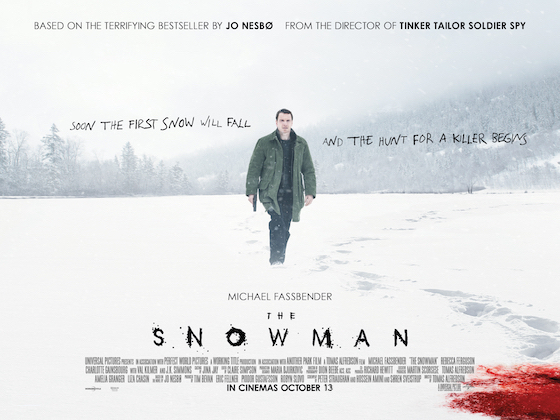
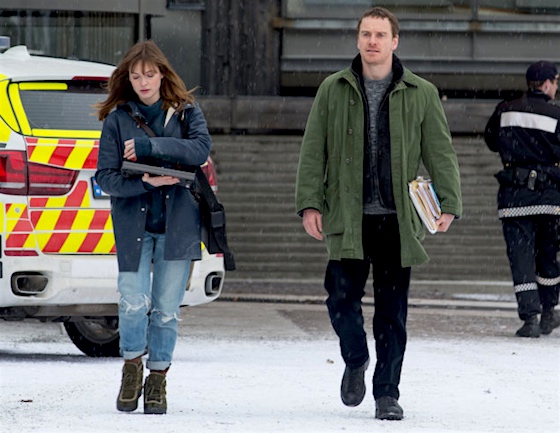


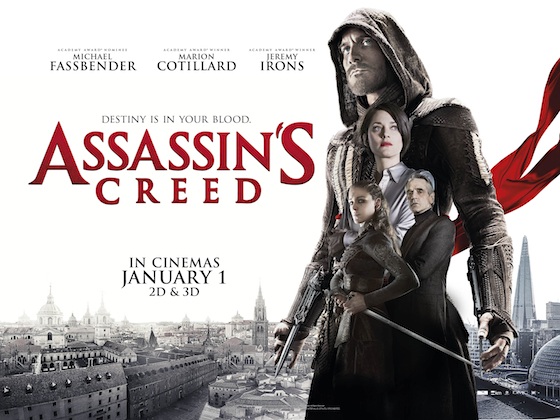
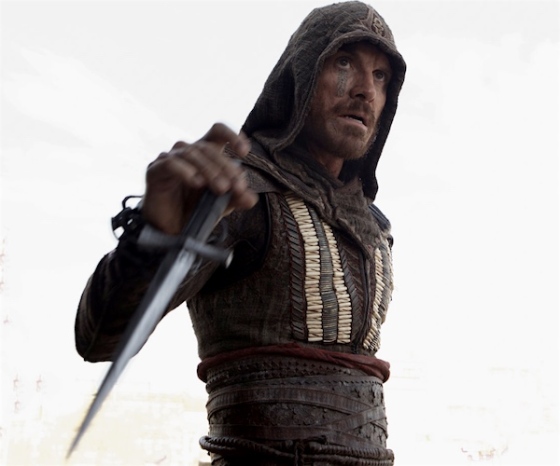
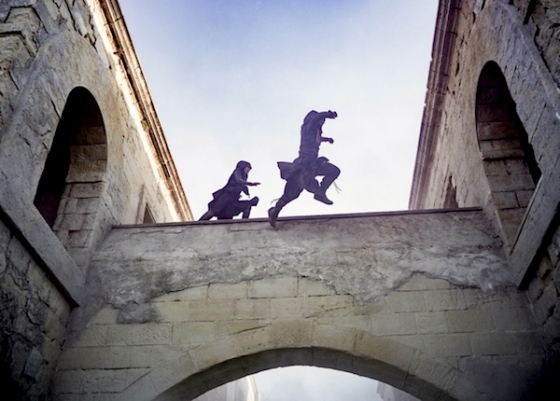
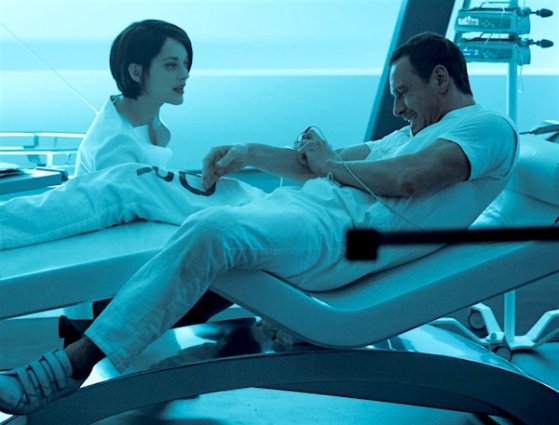




 Written by Aaron Sorkin and directed by Danny Boyle, with a name cast and plenty of awards buzz, this biopic of the eponymous tech genius was an inexplicable box office flop on its release last year — proof if proof were needed that box office does not equal quality, because I thought it was thoroughly excellent.
Written by Aaron Sorkin and directed by Danny Boyle, with a name cast and plenty of awards buzz, this biopic of the eponymous tech genius was an inexplicable box office flop on its release last year — proof if proof were needed that box office does not equal quality, because I thought it was thoroughly excellent. Boyle’s decision to use different film formats for each section — 16mm, then 35mm, then digital HD — helps delineate the eras and, in a way, reflect the products being launched (though I’ll instantly concede that last point may be a bit of a stretch). I imagine it’s too technical a concern to be noticed by your average filmgoer, but I’m sure it must have a subtle effect; and for those of us who are so minded to spot the change, it’s kinda fun and effective. Shot by Alwin H. Küchler, each section has its own charm, from the warm fuzziness of 16mm, to the gloss of 35mm, to the precision of digital. This is a mighty fine looking film, and while modern tech meant the 1080p Amazon Video stream I was watching looked darn near Blu-ray quality, I’m still miffed I didn’t just go straight for the disc, because now I’m going to have to pay for it again at some point.
Boyle’s decision to use different film formats for each section — 16mm, then 35mm, then digital HD — helps delineate the eras and, in a way, reflect the products being launched (though I’ll instantly concede that last point may be a bit of a stretch). I imagine it’s too technical a concern to be noticed by your average filmgoer, but I’m sure it must have a subtle effect; and for those of us who are so minded to spot the change, it’s kinda fun and effective. Shot by Alwin H. Küchler, each section has its own charm, from the warm fuzziness of 16mm, to the gloss of 35mm, to the precision of digital. This is a mighty fine looking film, and while modern tech meant the 1080p Amazon Video stream I was watching looked darn near Blu-ray quality, I’m still miffed I didn’t just go straight for the disc, because now I’m going to have to pay for it again at some point. The dialogue they’re delivering is so Sorkin. Rearrange character names and you could drop this into
The dialogue they’re delivering is so Sorkin. Rearrange character names and you could drop this into  In a similar vein, I suspect it would make a great companion piece to
In a similar vein, I suspect it would make a great companion piece to 
 Despite fathering the modern superhero movie genre, the X-Men series always seems to punch under its weight at the box office (a point the recent
Despite fathering the modern superhero movie genre, the X-Men series always seems to punch under its weight at the box office (a point the recent  That’s only the half of it, though. This is an X-Men movie, which not only means there’s an ensemble cast, but that it’s dedicated to constantly adding new members to it. This time around, we’re re-introduced to the ‘original’ team as teenagers: Scott Summers (Tye Sheridan) is the viewer’s “way in” to Xavier’s school after he suddenly starts shooting laser beams from his eyes; there he meets Jean Grey (Sophie Turner), a powerful telepath the other students are scared of because sometimes her dreams shake the school at night; Mystique rescues blue-skinned German teleporter Nightcrawler (Kodi Smit-McPhee) from a cage fight in Berlin, where he was up against Angel (Ben Hardy), who becomes one of Apocalypse’s Four Horsemen, alongside weather controlling street kid Storm (Alexandra Shipp) and Psylocke (Olivia Munn), who can create blades of energy with her hands. And there’s also Jubilee (Lana Condor), who has bugger all to do. Jubilee was a major character in the animated series, and the filmmakers seem obsessed with getting her into the movies (she had cameos in the first trilogy) without ever actually giving her anything to do.
That’s only the half of it, though. This is an X-Men movie, which not only means there’s an ensemble cast, but that it’s dedicated to constantly adding new members to it. This time around, we’re re-introduced to the ‘original’ team as teenagers: Scott Summers (Tye Sheridan) is the viewer’s “way in” to Xavier’s school after he suddenly starts shooting laser beams from his eyes; there he meets Jean Grey (Sophie Turner), a powerful telepath the other students are scared of because sometimes her dreams shake the school at night; Mystique rescues blue-skinned German teleporter Nightcrawler (Kodi Smit-McPhee) from a cage fight in Berlin, where he was up against Angel (Ben Hardy), who becomes one of Apocalypse’s Four Horsemen, alongside weather controlling street kid Storm (Alexandra Shipp) and Psylocke (Olivia Munn), who can create blades of energy with her hands. And there’s also Jubilee (Lana Condor), who has bugger all to do. Jubilee was a major character in the animated series, and the filmmakers seem obsessed with getting her into the movies (she had cameos in the first trilogy) without ever actually giving her anything to do. It doesn’t help that they feel the need to shoehorn a Wolverine cameo in there, an underwhelming action sequence that becomes a massive aside from the main storyline. It feels like setup for something more next time, but Hugh Jackman has stated
It doesn’t help that they feel the need to shoehorn a Wolverine cameo in there, an underwhelming action sequence that becomes a massive aside from the main storyline. It feels like setup for something more next time, but Hugh Jackman has stated  Another element lost in the mix is the real-world resonance contained in the best X-films. There’s a lot of to be said for the spectacle that’s present in all the movies, but Days of Future Past (for the most recent example) anchored it in the human conflicts between the heroes, and in their relation to the rest of the world. Apocalypse nods in that direction, with Mystique invoking Magneto’s metaphorical family to get him to stop destroying the world, but it’s not as well integrated, not as effective as previous outings. Said destruction is on a massive scale, but it’s too massive — the film doesn’t sell it; it’s just another city being destroyed somehow, emotionless computer-generated effects that are overfamiliar in these megablockbusters now (and not helped when you’ve seen similar sights two or three times right before the film in trailers for the likes of
Another element lost in the mix is the real-world resonance contained in the best X-films. There’s a lot of to be said for the spectacle that’s present in all the movies, but Days of Future Past (for the most recent example) anchored it in the human conflicts between the heroes, and in their relation to the rest of the world. Apocalypse nods in that direction, with Mystique invoking Magneto’s metaphorical family to get him to stop destroying the world, but it’s not as well integrated, not as effective as previous outings. Said destruction is on a massive scale, but it’s too massive — the film doesn’t sell it; it’s just another city being destroyed somehow, emotionless computer-generated effects that are overfamiliar in these megablockbusters now (and not helped when you’ve seen similar sights two or three times right before the film in trailers for the likes of  In fact, the film as a whole feels a draft or two away from being truly ready. Some of the dialogue clunks hard, especially when characters speak in exposition to one another. The plot needs streamlining and focusing, especially early on, and some events need appropriate weight added to them. Other things just need smoothing out — that trip to the mall happens Just Because, with no real sense of why the characters are doing it (other than some handwaving dialogue about needing to get out of the school for a change), and, as I said, in the final cut only leads to one single joke. Yet for all that, some things do work beautifully: Storm’s hero-worship of Mystique comes up almost in passing early in the film, establishing/emphasising Mystique’s place in the mutant world now; but then it becomes a key point in the climax without the need for any explanatory dialogue, as Storm wordlessly realises that her hero is fighting on the other side. It is, in a way, the best bit of the movie.
In fact, the film as a whole feels a draft or two away from being truly ready. Some of the dialogue clunks hard, especially when characters speak in exposition to one another. The plot needs streamlining and focusing, especially early on, and some events need appropriate weight added to them. Other things just need smoothing out — that trip to the mall happens Just Because, with no real sense of why the characters are doing it (other than some handwaving dialogue about needing to get out of the school for a change), and, as I said, in the final cut only leads to one single joke. Yet for all that, some things do work beautifully: Storm’s hero-worship of Mystique comes up almost in passing early in the film, establishing/emphasising Mystique’s place in the mutant world now; but then it becomes a key point in the climax without the need for any explanatory dialogue, as Storm wordlessly realises that her hero is fighting on the other side. It is, in a way, the best bit of the movie. Despite being a negative nelly for much of this review (like so many others, which has given it a lowly
Despite being a negative nelly for much of this review (like so many others, which has given it a lowly 
 Macbeth is my favourite Shakespeare play. Not that I’m a great scholar of the Bard, but I’ve seen and/or read enough to have a favourite. I also think it’s one of his most accessible works: its story and characters are relatively straightforward without being devoid of complexity; it’s got some immensely effective imagery and dialogue, including a solid compliment of famous lines; and it’s not excessively long either (it’s Shakespeare’s shortest tragedy, in fact). I also studied it twice over in secondary school, so I know it fairly well. Now, this doesn’t mean I have exacting standards when it comes to film adaptations (Shakespeare is plenty open to interpretation), but it does mean I have my expectations up, especially as there isn’t a film version of Macbeth that could reasonably be described as “definitive” (though I know
Macbeth is my favourite Shakespeare play. Not that I’m a great scholar of the Bard, but I’ve seen and/or read enough to have a favourite. I also think it’s one of his most accessible works: its story and characters are relatively straightforward without being devoid of complexity; it’s got some immensely effective imagery and dialogue, including a solid compliment of famous lines; and it’s not excessively long either (it’s Shakespeare’s shortest tragedy, in fact). I also studied it twice over in secondary school, so I know it fairly well. Now, this doesn’t mean I have exacting standards when it comes to film adaptations (Shakespeare is plenty open to interpretation), but it does mean I have my expectations up, especially as there isn’t a film version of Macbeth that could reasonably be described as “definitive” (though I know  What I mean, more specifically, is that he’s visualised parts of the text; applied the old rule of “show don’t tell”. So rather than a messenger giving the King a full account of Macbeth being awesome in battle, we see some of the combat; Banquo has hardly any lines early on, but we still understand his friendship with Macbeth just from the way they look at one another and go into battle together.
What I mean, more specifically, is that he’s visualised parts of the text; applied the old rule of “show don’t tell”. So rather than a messenger giving the King a full account of Macbeth being awesome in battle, we see some of the combat; Banquo has hardly any lines early on, but we still understand his friendship with Macbeth just from the way they look at one another and go into battle together. Cotillard is fantastic in all of this, and certainly worked hard for it: the way the French language applies emphasis is not suited to delivering iambic pentameter, apparently, so she worked hard with a dialect coach to nail her delivery. Her accent clearly marks Lady Macbeth as the only non-Scottish character here, which becomes another layer added to this interpretation.
Cotillard is fantastic in all of this, and certainly worked hard for it: the way the French language applies emphasis is not suited to delivering iambic pentameter, apparently, so she worked hard with a dialect coach to nail her delivery. Her accent clearly marks Lady Macbeth as the only non-Scottish character here, which becomes another layer added to this interpretation. a good film based on a computer game.
a good film based on a computer game. 2014 Academy Awards
2014 Academy Awards As we know, the Oscars are racist and always have been, especially recently. Like two years ago, when they didn’t give a load of nominations and several awards to a film about slavery from a black director and black screenwriter.
As we know, the Oscars are racist and always have been, especially recently. Like two years ago, when they didn’t give a load of nominations and several awards to a film about slavery from a black director and black screenwriter. who will break your heart, and Michael Fassbender, who is overdue the gong for his many varied and accomplished performances. (I doubt his forthcoming triple of
who will break your heart, and Michael Fassbender, who is overdue the gong for his many varied and accomplished performances. (I doubt his forthcoming triple of  The Coens and Wes Anderson are common reference points in reviews of this slightly quirky Western, which sees Michael Fassbender’s experienced outlaw-type help wet-behind-the-ears Scotsman Kodi Smit-McPhee track the girl he loves, who emigrated for mysterious reasons, also known by the bounty hunters on their trail.
The Coens and Wes Anderson are common reference points in reviews of this slightly quirky Western, which sees Michael Fassbender’s experienced outlaw-type help wet-behind-the-ears Scotsman Kodi Smit-McPhee track the girl he loves, who emigrated for mysterious reasons, also known by the bounty hunters on their trail. One of the big stories in the run-up to this fifth X-Men film’s release last year (my previous review is
One of the big stories in the run-up to this fifth X-Men film’s release last year (my previous review is  (though the theatrical cut only has 40 chapters, so I’m not entirely sure how that pans out). Most must be teeny extensions, however, and I look forward to
(though the theatrical cut only has 40 chapters, so I’m not entirely sure how that pans out). Most must be teeny extensions, however, and I look forward to  The Rogue Cut is worth seeing for anyone who enjoyed the theatrical version — and, in terms of a copy to own, the Blu-ray comes with both cuts and more special features (though it loses all the extras from the first release, including a few more deleted scenes) — but, unless you’re a huge fan of Rogue or Iceman, it’s not essential.
The Rogue Cut is worth seeing for anyone who enjoyed the theatrical version — and, in terms of a copy to own, the Blu-ray comes with both cuts and more special features (though it loses all the extras from the first release, including a few more deleted scenes) — but, unless you’re a huge fan of Rogue or Iceman, it’s not essential.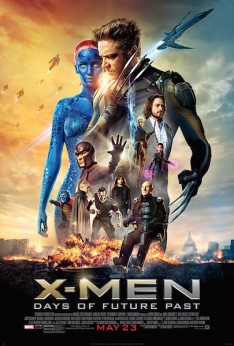 I think I’ve previously discussed my life-long love of the X-Men franchise, so I shan’t go into detail again, but suffice to say Days of Future Past has been one of my most-anticipated movies ever since the title (which is that of a classic and influential story from the comics) was announced. Thank goodness, then, that the final result doesn’t disappoint.
I think I’ve previously discussed my life-long love of the X-Men franchise, so I shan’t go into detail again, but suffice to say Days of Future Past has been one of my most-anticipated movies ever since the title (which is that of a classic and influential story from the comics) was announced. Thank goodness, then, that the final result doesn’t disappoint.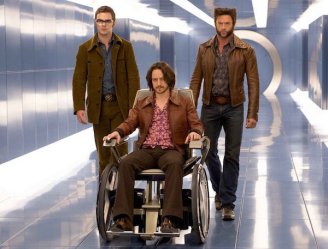 Beyond that, there’s the characters: the younger versions are having to deal with the fall-out from
Beyond that, there’s the characters: the younger versions are having to deal with the fall-out from  Not everyone gets to shine in a cast this big, although pretty much everyone gets a moment. The future-set cast have the least to do, people like Halle Berry turning up to do little more than show their face, though Stewart and McKellen get a moment or two worthy of their talents. After he was the focus of the last film, Fassbender is slightly shortchanged here; but after McAvoy gave him essential support in First Class, Fassbender plays the same service here, informing Charles’ journey. Of the new additions, Evan Peters as Quicksilver (that’s the one who’ll also be played by Aaron Taylor-Johnson in
Not everyone gets to shine in a cast this big, although pretty much everyone gets a moment. The future-set cast have the least to do, people like Halle Berry turning up to do little more than show their face, though Stewart and McKellen get a moment or two worthy of their talents. After he was the focus of the last film, Fassbender is slightly shortchanged here; but after McAvoy gave him essential support in First Class, Fassbender plays the same service here, informing Charles’ journey. Of the new additions, Evan Peters as Quicksilver (that’s the one who’ll also be played by Aaron Taylor-Johnson in  Later, there’s the aforementioned ‘slow-mo’ sequence, and the grand climax, which offers more “fly something big around” antics a la First Class’ submarine, only considerably grander. Yet for all the spectacle, the final moments once again come down to character: what is Magneto prepared to do? What is Mystique prepared to do? Will anyone listen to Charles? And so on. Even the much-vaunted Marvel Studios movies tend to base their climaxes in slabs of ‘epic’ CGI crashing into each other; Days of Future Past does that for a bit, then brings the characters back into focus for the real final beats.
Later, there’s the aforementioned ‘slow-mo’ sequence, and the grand climax, which offers more “fly something big around” antics a la First Class’ submarine, only considerably grander. Yet for all the spectacle, the final moments once again come down to character: what is Magneto prepared to do? What is Mystique prepared to do? Will anyone listen to Charles? And so on. Even the much-vaunted Marvel Studios movies tend to base their climaxes in slabs of ‘epic’ CGI crashing into each other; Days of Future Past does that for a bit, then brings the characters back into focus for the real final beats.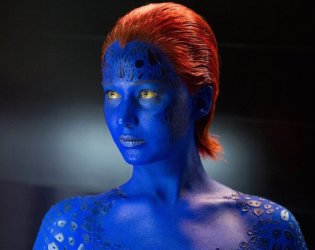 (Jennifer Lawrence being the third pillar of the past triumvirate, as they’ve already focused on Xavier and Magneto). While Days of Future Past does wrap up the majority of its threads (the open-ended ones are answered by previous films, if you want them to be), there’s plenty there to play with in the next film (and, perhaps, ones beyond that) if they want to… which they do.
(Jennifer Lawrence being the third pillar of the past triumvirate, as they’ve already focused on Xavier and Magneto). While Days of Future Past does wrap up the majority of its threads (the open-ended ones are answered by previous films, if you want them to be), there’s plenty there to play with in the next film (and, perhaps, ones beyond that) if they want to… which they do.